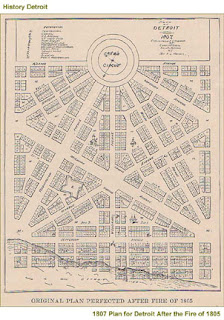Synopsis: Take our guiding concept/philosophy: a cultural nerve center where people, places, and creative work intersect quite literally and take a look at the site of our intersection specifically.
Premise: Makers of creative work respond to our Intersection (Woodward & MLK/Mack.) What they can see, hear, smell, people they meet, architecture, sunlight, history, anything.
This is a site-specific, potentially collaborative exhibition with wide open possibilities for traditional media, performance, video, web projects, and more. We’ll be utilizing our interior, exterior corner, the courtyard behind building between the Nevelson pieces (Robert Sosnick Sculptural Park), and the neglected triangular park down the street between MLK and Davenport – an excellent beautification project/performance site.
Some Thoughts
“Neighborhoods have life spans. They begin, evolve, mature and die. But while this evolution is displayed by the decline of its buildings, it seems that the lives of the inhabitants are the internal force which generates the decay. People, not buildings, are the heart of the matter.” – Will Eisner, from his Introduction to his graphic novel, “Dropsie Avenue.”
Henry David Thoreau stated in “Walden” that, “a man can walk forever in an area of only a few square miles.” It’s but a short leap from Thoreau walking to the mathematical concept of fractals. Fractal figures possess self-similarity, which (quite overly simplified) means that as we look closer into the depths of the figure, ever greater complexity is revealed. As Thoreau did, a fractal walk in the most confined of areas continually leads to new discoveries.
The artistic movement known as the Situationist International offers a similar way of walking. In their view, art is not about making a spectacle for others to consume, but about embedding art in everyday life, activities in which all could participate, and help foster engagement in the reality of living. One method of achieving this expanded awareness is known as the dérive, a walk that is more of a “drifting” through a place than a direct journey. Like the fractal walk, the dérive allows the walker to make new discoveries in his/her environment – an adult Easter egg hunt of sorts.
Again, the deeper we look, the more we discover.
In some ways then, through the literal exploration of this single corner, this intersection, from a multitude of perspectives, we can see it as a microcosm of something much larger. The “world in a grain of sand” as it were. This intersection of people, places, and means of creative working, is an opportunity to truly look deeply and to learn much from one another in the process.
I welcome the opportunity to work with and learn from all of you. – Nick Sousanis
Dates
o Initial Exhibition Gathering June 6, 2007
The roadmap to the September 15, 2007 Exhibition Opening is as follows:
o July 2, 2007: Initial Proposals Due
o Tuesday, July 10, 2007: Second Gathering at Work@Detroit.
•Initial Proposals presented to group, opportunity for further collaboration, time to shape the look, feel of the exhibition.
o July 24, 2007: Final Proposals Due, biographical information, artists statements gathered.
o End of August/Beginning of September 2007: Work Delivered or arrangement to install agreed upon (Exact dates to be determined.)
o September 15, 2007: Exhibition Opening! – to be followed by talks, performances, etc.
Contact Info: Nick Sousanis
nicksous@umich.edu or ws@thedetroiter.com
313 593-0949 c: 248-396-5530
Detroit Center General Phone: 313 593-3584



 Despite laying out the city, and founding the University of Michigan, this eccentric and powerful leader was sent on his way. Woodward would accept another judgeship in the state of Florida, but his death shortly after arriving would limit his influence on the region.
Despite laying out the city, and founding the University of Michigan, this eccentric and powerful leader was sent on his way. Woodward would accept another judgeship in the state of Florida, but his death shortly after arriving would limit his influence on the region.